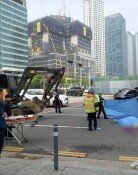Stricter review of an arrest warrant needed
Stricter review of an arrest warrant needed
Posted November. 27, 2017 08:22,
Updated November. 27, 2017 08:44
The Seoul Central District Court decided to release former Deputy Defense Minister Lim Kwan-bin on Friday, after he was arrested over alleged involvement in the military’s illegal cyber activities to manipulate online public opinion during the Lee Myung-bak administration. This announcement came two days after the release of former Defense Minister Kim Kwan-jin, who was arrested on the same charge. The District Court’s Judge Kang Bu-young, who is in charge of issuing the warrant, also rejected the arrest warrant for former Senior Presidential Secretary Jeon Byeong-heon, who was charged with receiving 300 million won in bribes from Lotte Homeshopping Inc.
This time, prosecutors have gone too far with requesting for arrest warrants against Kim and Lim. In fact, two former Cyber Commanders Yeon Je-wook and Ok Do-kyung, who headed the military’s cyber command under the Lee Myung-bak administration, have never been arrested. Yeon was sentenced to eight months in jail and two years in probation, and Ok was given eight months’ imprisonment with a suspended sentence. Therefore, the prosecution’s hasty decision to arrest and investigate former Minister Kim and Deputy Minister Lim of National Defense, who are more senior to the two former Cyber Commanders, goes against equality.
Until now, an arrest warrant has been released only when there is a “change in circumstance” in which the suspect has reached a consent with the victim, or has confessed to the facts of suspicion, after his or her arrest. Consequently, despite the constitutionally guaranteed system of reviewing the legality of an arrest, the decision of the warrant judge is regarded as the final decision on warrant. There has been a tendency that prosecutors issue arrest warrants more excessively in the name of the eradication of the deep-rooted evils and warrant judges follow suit to avoid public criticism, particularly during the Moon Jae-in administration. The court’s decision to release the arrest warrant is seen as the right move that stopped this tendency based upon the principle of the criminal procedure law called “nonrestraint investigation.”
Judge Kang, who rejected Jeon’s arrest warrant, is the judge who issued warrants for Kim and Lim. It is unusual for a judge to dismiss the superior’s warrant although his aides are arrested on alleged bribery. However, investigation without physical detention is appropriate if there is a controversy over allegations and there is no concern over tampering with evidence or escaping. Nevertheless, given that former presidential secretary Jeon was not a former political figure during the previous government but a former member of the ruling party under the current government, there is a suspicion that prosecutors are just being lukewarm toward the arrest while raiding and conducting rigorous investigation into the former administrations’ allegedly illegal activities.
Public sentiment is growing weary of learning more about prosecution against the so-called deep-rooted evils, led by Yoon Seok-youl, chief prosecutor of the Seoul Central District Prosecutors’ Office, as prosecutors sought an arrest warrant for a former defense minister during the Lee Myung-bak administration and all three National Intelligence Service chiefs from the Park Geun-hye administration, over the intelligence agency payment to the presidential office. The prosecution should not argue with the court over the rejection of an arrest warrant, but should accept the court’s decision and be prepared for the subsequent stricter review of a warrant’s validity.







